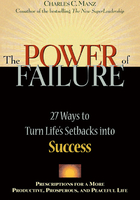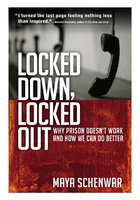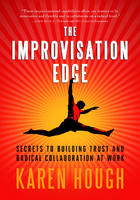The Stuck Community
The existing community context is one that markets fear, assigns fault, and worships self-interest. This context supports the belief that the future will be improved with new laws, more oversight, and stronger leadership. Possibility thinking and associational life are marginalized, relegated to human interest and side stories in the media. The corporate model is the modern ideal, and the economy is the center story. The story in the stuck community defines the role of the media as framer of the debate. In community building, we need to realize that what the media reports is a reflection, not the cause of the conversation that citizens currently hold.
? ? ?
To create a new story, we first need to come to terms with the current one. This begins by naming it. The story of the stuck community can be heard both in the dominant public debate and also in what we talk to each other about each day. It is important to understand that there is a hidden agenda in every story. This agenda is a point to be made, a political belief about what is important, that stays constant regardless of the events of the day.
Marketing Fear and Fault
The overriding characteristic of the stuck community is the decision to broadcast all the reasons we have to be afraid. This is a kind of advertising that exploits the fear we have of violence, of the urban core, of terrorism, of African-Americans and other ethnic groups, of immigrants, of those who are poor or undereducated, of other religions, and of other countries. It seems like the lead story of every local evening newscast is about crime and human suffering, and if our city had none that day, then we hear how somewhere else in the world someone was murdered, bombed, killed in an accident, or abducted from what was once thought to be a safe place. What we are hearing is the marketing of fear.
In the telling, we are willing to sacrifice the wholeness and dignity of a person for the sake of capturing the emotion or drama of the moment. The marketing of fear thrusts a microphone in the face of someone who has just suffered an irreplaceable loss and asks, “How do you feel?” It is the commercialization of suffering for the sake of profit. Not that complicated.
When I was deputy press secretary at the White House, our credibility was so bad we couldn't believe our own leaks.
Bill Moyers
The marketing of fear is not just for profit; it also holds a political agenda. Fear justifies the retributive agenda, fundamentalist in the extreme, that has been on the rise for some time. The retributive agenda believes that a just and civil society is one that gives priority to restraints, consequences, and control, and underlines the importance of rules. It gets packaged as spiritual values, family values, the American way, love it or leave it, all under the umbrella of law and order. It helps build the incarceration industry and the protection industry, it creates a platform so that those in power can expand their power, and it discounts the rehabilitation industry. Fear forms the basis of our recent foreign policy and drives much of our legislation. Fear also fuels the allure of suburban life and is a subtle but clear argument against diversity and inclusion.
? ? ?
In addition to marketing fear, the stuck community markets fault. When there is a human tragedy, most of the energy goes into finding who was to blame. There is a retributive search for responsibility and a corresponding defense from the players claiming their innocence. Fault marketing rests on the belief that if we can assign blame and find cause, it is useful to society and somehow reassures us that it won't happen again. To me, this is irrational thinking. What is missing here is a recognition of the complexity of human affairs, an acknowledgment of the paradoxical and accidental nature of life. There is no insurance policy against the human condition.
Out of the decision to dwell on fear and fault, the community is stuck in a context that holds the following:
? We are a community of problems to be solved. Those who can best articulate the problems and who can best articulate the solutions dominate the conversation.
? The future is defined by the interplay of self-interests, dependent on the accountability of leaders, and controlled by a small number of wealthy and powerful people, commonly lumped into the category we call “they.”
? Community action is aimed at eliminating the sources of our fear. We aim at a set of needs and deficiencies. In order to eliminate our fear and respond to the neediness of our people, we try harder at what we have been doing all along. We lock down neighborhoods, build more prisons, and reduce tolerance to zero. We call for better programs, more expertise, more funding, better leadership, stronger consequences, and more protection. We are committed to trying harder at what is not working.
Ramping Up Laws and Oversight
When something goes wrong, we carry the illusion that after we find the guilty party, some kind of legislation or change in policy will prevent the crime or accident from happening again. We are stuck in the belief that we can legislate the future and mandate morality. In Cincinnati we passed an ordinance that street people had to be licensed to ask passersby for money. The idea was that somehow I now would be comfortable going downtown knowing that the person asking for money had been certified and approved by the city council. Now even panhandling was professionalized. The ordinance did not bring more people into town at night.
The concern about street safety and increasing the comfort and quality of the urban experience is of course legitimate. What limits us and undermines our quest for authentic community is the belief that fault finding, legislation, and enforcement can give us the security we seek. But this thinking is just too simplistic and reductionist. It is more a response to our need to take action and look like problem solvers, rather than finding a durable answer to a complex civic issue.
A corollary to more laws is the push for more oversight. We think that more watching improves performance. All the evidence is to the contrary, for most high-performing communities and organizations are heavily self-regulating. My favorite quote on this is “Research causes cancer in rats.” It is reasonable to understand that the act of oversight may in fact increase the very thing that is being watched with the intent of reducing it.
The political agenda of the stuck community says that citizens and employees are incapable of monitoring themselves and controlling each other, and that more careful oversight, institutionally mandated and installed, will build community and provide for the common good. It is in fact an argument against building community and ends up leaving us more dependent on specialists and special designees of the state. It provides the argument for monarchy. Someone to watch over me.
Romanticizing Leadership
Carole Schurch was taking care of the logistics of a conference on transformation. She opened the event by announcing, “The restrooms are down the hall on the left, lunch will be at 1:00 p.m., dinner is at 8:00 p.m., and the conference will be over tomorrow afternoon. Let me know if I can help you with anything and also let me know what time your mother is picking you up!”
We love our habit of dependency and accept the culture of retribution because it reinforces the case for strong leaders—“strong” being the code word for autocratic, a message our culture is increasingly willing to accede to. We are fascinated with our leaders. We speak endlessly, both in the public conversation and privately, about the rise and fall of leaders. The agenda this sustains is that leaders are cause and all others are effect. That all that counts is what leaders do. That leaders are the leverage point for building a better community. That they are foreground while citizens, followers, players, and anyone else not in a leadership position is background. This is a deeply patriarchal agenda, and it is this love of leaders that limits our capacity to create an alternative future. It proposes that the only real accountability in the world is at the top. They are the only ones worth talking about.
The effect of buying in to this view of leadership is that it lets citizens off the hook and breeds citizen dependency and entitlement. It undermines a culture where each is accountable for their community. The attention on the leader makes good copy, it gives us someone to blame and thereby declares our innocence, but it does not contribute to building community. In its own way, it reinforces individualism, putting us in the stance of waiting for the cream to rise, wishing for a great individual to bring light where there was darkness.
What is missing or dismissed here are the community-building insights about how groups work, the power of relatedness, what occurs when ordinary people get together. We write communal possibility off as just another meeting, the blind leading the blind, citizens coming together to pool ignorance or to speak “truth to power,” which is just a complaint session in evening clothes.
As an aside, to return to in more depth later, some reasons for discounting the power of citizens are well founded, for most of the time when citizens come together it makes no difference. That's because they operate under the retributive principles that I am trying to describe in this section. They want to define the problem, find fault, elaborate fear, demand control-oriented action, and point to leaders. Many citizens get engaged in community only when they are angry.
If we keep engaging citizens in this traditional way, then no amount of involvement will make a difference. The way we currently gather has no transformational power. This is what needs to change, for if we do not change the way citizens come together, if we do not shift the context under which we gather and do not change the methodology of our gatherings, then we will have to keep waiting for great leaders, and we will never step up to the power and accountability that is within our grasp.
Marginalizing Possibility
Given the dominant context that values scarcity, leadership, individualism, fear, and fault, anything positive or hopeful becomes an anomaly. An exception, an accident. To choose possibility means I have to confront cynicism. Journalism, human services, corrections, and public safety are professions that claim their cynicism comes from constant contact and familiarity with the dark side of society. This ignores the reality that what you see comes from what you choose to look at. Decide that all the news fit to print is about problems, and that is what you get. In the retributive culture, cynicism is the norm and becomes the lead story. Cynicism justifies retribution. Retribution is fueled by cynicism.
In this context, possibility and vision become buried in the middle section of the news, or become an upbeat pat on the back as the anchor goes off the air. Possibility and faith are seen as threatening because they are an indictment of cynicism. So it is not by accident that when citizens do find a way to use their gifts, or commit to something thought impossible, or bring faith and gratitude into the world, the story is reduced to a “human interest” piece—the kiss of death when it comes to changing our context. Many reporters do not even consider these stories journalism.
This is one way possibility is trivialized. When labeled “human interest,” possibility doesn't qualify as news. It is a feel-good diversion. Something to calm our nerves. Possibility and the faith that supports it may be strong declarations for the individual, but for the collective, they are neutered and treated as merely charming.
Possibility also gets undermined by being confused with optimism. Even when leaders speak to the possibility of our community, in the stuck community we consider it a motivational speech, a sales pitch, a bootstrap keynote to make people feel better, to lift our spirits from what we call reality. But possibility is not a prediction, or a goal; it is a choice to bring a certain quality into our lives. Optimism, which is a prediction about the future, has no power. Pessimism is equally irrelevant.
The ways in which possibility is marginalized underline the importance of context. All that does not confirm the prevailing mindset is made marginal and cute. This is why, if you want to create an alternative future, you have to shift the context, for all that disconfirms the current context will be discarded. We need to shift what is considered “reality.” For example, if we see the media as a reflection of who we are, why not value with our listening the media that promotes learning and possibility, documents miracles, and reports on a different agenda, and call it the “new reality”? Les Ihara, a longtime state senator in Hawaii, says that what is needed is “a shift in the ground of being that reports the news.” If we take that seriously, as factual and true, then something new is brought into the world.
Devaluing Associational Life
John McKnight has studied communities for 30 years and found that community is built most powerfully by what he calls “associational life,” referring to the myriad ways citizens come together to do good work and serve the public interest. Whether in clubs, associations, informal gatherings, special events, or just on the street or at breakfast, neighborly contact constitutes an uncounted and unnoticed glue and connection that makes good communities work.
The stuck community essentially discounts associational life and instead values, and even glorifies, the “system” life, especially the private sector and corporate mindset. This context is so around us that we have become anaesthetized to it. Although there is a growing awareness of the cost of this mindset (see David Korten), we still act as if what is good for business is good for the country.
Here are some ways in which we discount associational life, the place where the social fabric is built:
? The only true measure of community is its economic prosperity. We seek the American dream, streets paved with gold. The only good news that makes the news is when Toyota decides to build a plant in our town. Communities will justify spending infinite amounts of money to keep sports teams because they are theoretically good for the economy. Job creation is the final argument for most of our mistakes.
? We name social service and institutions that serve the public good “not for profits.” “Not for profit” means that service and generosity are defined by what it is not. What kind of identity and esteem does this establish for the choice for service and care for community? Can you imagine introducing yourself as the name you are not? “Hello, my name is not Alice.” “Well, I would like you to meet my friend, not Roger.” There is no identity in that. Nothing memorable or recognizable next time we meet. There is a movement to call it the “public benefit” sector. Not such a bad thing.
? Associations are under constant pressure to be more corporate: to merge, become more efficient, submit to external oversight, measure harder, and submit to greater accountability. These are core values in the private sector. A natural outgrowth of this is the way many foundations, which exist for the sake of community service, treat corporations as their clients. In the philanthropic world you also hear people talk about their “return on social investment.” We use the language of commerce when talking about the field of generosity.
? The public benefit sector makes front page news only when there is scandal. The head of a large agency who spends funds on limousines and high living is front page for days. When the same agency softens the landing for people in a tragedy or turns people's lives around, the story is at best a footnote.
? We marginalize compassion in the public conversation. Here's an example: As an effort to build the image and well-being of the city, Go Cincinnati is about streetcars, housing development, and attracting new businesses. It sells hard the strengths of the city, including the arts, entertainment, and sports attractions. All good things to sell and essential to a city that works. What is missing in this conversation and sales pitch is the compassion of a city. Having a large number of social services in a neighborhood is seen as a weakness, not a selling point. The view is that if people need help, if they are vulnerable or in crisis, it is a communal liability. The generosity that serves these people goes unmentioned as an asset.
Reinforcing Self-Interest and Isolation
These dimensions of the way we talk about our community and the dominant stories we tell about our community work together to create an insular mentality. Under the siege of fear, fault, and the rest, people and institutions build a wall around themselves and are primarily concerned with their own survival. This gives us a community where each sector—business, education, government, social service, health care—is so focused on its own affairs that those who choose to commit to the well-being of the whole have a difficult time gaining a foothold.
And what exists for our institutions is reinforced by citizens. Citizens mostly get engaged when something threatens their backyard. They show up in public settings when they are angry; they become activated by narrowly defined interests.
Both institutions and active citizens are sincere and often effective in the pursuit of their own well-being, of matters that occur within their own boundaries. But no matter how effective they are in pursuing their interests, the community as a whole does not change, especially for those on the margin. In an individualistic culture, the social capital, the fabric of community, does not get built.
To summarize, the context of retribution and the story that grows out of it cause our attempts to build community to be what actually keeps it unchanged. Our retributive approach to the symptoms of poverty, violence, homelessness, and cynicism does not create these symptoms but interferes with their changing. Retribution by its nature serves to fragment community and reduce social capital. The side effect is that each citizen's accountability for the well-being of community is reduced. When the context is retributive, reduced accountability and diminished social capital are the direct outgrowths of our very efforts to improve community. And this mostly occurs as an unintended consequence, for no one holds a fragmented community as a goal.
The retributive context, given form through the dominant public conversation, is based on a culture of fear, fault finding, fragmentation, and worrying more about taxes than compassion; it is more about being right than working something out, more about gerrymandering for our own interests than giving voice to those on the margin. Other than that, it is fine.
The Media
As a key messenger of context in the stuck community, the media takes its cue from citizens and makes its living from retribution. The public conversation most visible to us is the interaction between what we citizens want to hear and the narrative put forth by the media. But it is too easy to blame the media for valuing entertainment over news and for selling fear and problems over generosity and possibility. It is more useful to see that the media is a reflection of who we, as citizens, have become.
The news is most usefully understood as the daily decisions about what is newsworthy. This is a power that goes way beyond simply informing us. The agenda in each story defines what is important, and in doing this, it promotes an identity for a community.
The problem, of course, was that Baba saw the world in black and white. And he got to decide what was black and white.
Khaled Hosseini, The Kite Runner
This means the real importance of the media is not in the typical debate over the quality, balance, or even accuracy of what is reported. These vary with the channel, the network, the newspaper, the Web site. They vary with having the resources to get the whole story, the market segment it is aiming at, and its editorial agenda. What is most important, and the power that is most defining, is the power of the media to decide what is worth talking about. As British newspaper pioneer Lord Northcliffe once said, “News is what somebody somewhere wants to suppress; all the rest is advertising.”
The media's power is the power to name the public debate. Or, in other words, the power to name “reality.” This is true for the mainstream as well as online media.
The point is this: Citizens have the capacity to change the community story, to reclaim the power to name what is worth talking about, to bring a new context into being. Those of us who create the current dominant context for the community conversation drive the conditions that nurture a retributive context or a retributive community. If we do not choose to change this context and the strategies that follow from it, we will produce no new outcomes for our institutions, neighborhoods, and towns.















